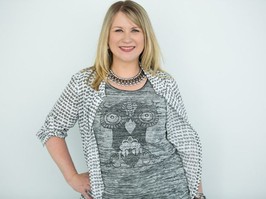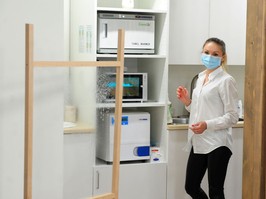meet the chick changing the myths around menopause
shirley weir: "it's been embedded in women’s psyche that their health comes last."

shirley weir is the founder of b.c. advocacy group menopause chicks
the first period is a major milestone in a girl’s life. it’s a sign of good health, everything moving along as it should. and on average, a woman will have 450 periods in her lifetime. you’d think once the bleeding finally stops, it would be time for a celebration. except that’s not how menopause is framed in western media. we’re told to expect everything from mood swings to a crumbling pelvic floor. and then there are the hot flashes – insert eye-roll here.enter shirley weir, founder of menopause chicks, a canadian advocacy group that is working hard to change the conversation around perimenopause and menopause. for years, weir has been debunking every myth about menopause and teaching women to navigate their midlife health. we caught up with her to talk about the myths of menopause, why it’s important for women to make themselves a priority and how health needs to be thought of as an investment.healthing: what is menopause chicks’ mission?shirley weir: our mission to empower women to navigate perimenopause to menopause and beyond, with confidence and ease.h: what’s the difference between menopause and perimenopause?sw: menopause is the 12-month anniversary of your final period. you have to go 12 consecutive months without a period before you reach menopause, and when you reach it, it’s like a milestone, rather than something you go through. i’ll be 53 next month. i reached menopause when i was 49 while the average age in north america is 51. perimenopause is the phase of life leading up to menopause, and if anyone is going to experience challenges, it will be then. post-menopause is every day after menopause for the remainder of your lifethe term ‘perimenopause’ was only invented in 1996, so it’s new in the context of medical discoveries. it’s a topic in medical school they spend one hour on. perimenopause can be five to 15 years, so someone can start experiencing perimenopause in their late 30s. it’s not a synonym for suffering, it’s a phase of life. hormones begin to fluctuate and prepare a woman’s body for post-menopause, which is every day after that anniversary. although for some women, hormone shifts can disrupt quality of life with experiences such as irregular bleeding, heavier bleeding, mood changes, sleep disruption or hot flashes.h: tell me about the moment you decided to start menopause chicks.sw: when i was 39, my breasts started to hurt. two years later, during a pap smear, i told my doctor i was struggling with sleep deprivation, brain fog, anxiety, and depression for the first time in my life. i told her i thought i might be experiencing the first signs of menopause. she looked at me and my chart and said, “you’re 41, you’re too young for menopause.” which is true. i was 10 years too young for menopause, but i wasn’t too young for perimenopause.i love my doctor but i thought it would be a more enlightened and informed conversation. instead, she offered me birth control pills, sleeping pills, and prozac. i sat there and thought, “oh my god, shirley, you have to suck this up, dig deep, and be stronger.” that lasted for about a second. by the time i got my clothes back on, i was thinking, “there’s no way i’m the only one in the world that feels this way right now.”so that’s when i did my research and started blogging. i got great feedback and the media started calling. that’s when i realized this is a very untapped space. i believe women deserve quality health information served to them on a free platform.h: how did you grow your group to more than 19,000 members?sw: i had a few events and my friends were supportive because they saw the gap in health information and in being their own health advocate. but i will not lie, there were a few friends who pushed back. one friend put her hand in my face and said, ‘shirley, i am not there yet. don’t post anything on my facebook page because i’m online dating and i don’t want anyone to know i have a friend in the menopause business.’another friend told me she would never talk about menopause with her doctor because he’s too good-looking. there are so many layers to these almost-taboo subjects and menopause is one of them.h: what are some of the stereotypes and myths around women and menopause?sw: there are a lot of stereotypes, one is that pain and suffering is just part of being a woman. you are not meant to suffer pain with your period. it’s supposed to be a natural cycle. we’re not meant to suffer. it’s been embedded in women’s psyche that their health comes last. for decades, women have been taking care of others: they’re looking after babies, teens, partners, and sometimes, aging parents. but when they get a tap on their shoulder from their body that says ‘you don’t normally wake up at 3 a.m.,’ women tend to put their own health on the back burner.the other myth is you will have hot flashes, they will be debilitating and they will disrupt your life. first of all, you may or may not experience anything. and secondly, if you do, you are not meant to suffer. there are viable solutions. that’s a sign that you are in a state of hormone imbalance and here’s a health professional that you can work with to not feel that way anymore and then just get on with enjoying the rest of your life.the third one is vaginal dryness. no one wants to talk about vaginal dryness and there are so many women who are suffering in silence. it’s quite common in post-menopause because estrogen fluctuates in perimenopause then declines after menopause. other women experience vaginal dryness too, some who are on the birth control pill or who are going through cancer treatment. but vaginal dryness needs to be addressed. if you experience vaginal atrophy, you are more susceptible to incontinence, which is a lifelong problem for so many women. so are urinary tract infections. it is not something that you have to suffer with or put up with. and it’s really easy to fix. if you experience those things, most women stop moving. and when women stop moving and stop exercising, their brain health declines.h: are there cultures that are doing menopause right?sw: in the japanese culture, there is no word for menopause. i think the other thing that happens in some of the eastern cultures is that they honour and revere their elders way more than we do here in north america. it’s a rite of passage to reach a certain age and acquire the wisdom and confidence that comes with being an older woman. i think that plays a huge role [in health] compared with what we experience here in canada, the u.s. the u.k., australia and new zealand.h: why hasn’t this conversation happened earlier?sw: at the turn of the last century, women lived to be 50. so this conversation was irrelevant because women had babies when they were 16 to 22 and died at 50. now, we are the first generation to turn 50 and have 50 more years to plan for. so perimenopause and menopause is like an awakening where women have this opportunity to invest in the health they want for their later decades. it’s so important, because if you were to go to a seniors’ home, you would find so many women suffering with osteoporosis, dementia, and incontinence. and those are three things that can prevented if you invest early enough. kind of like an rrsp, we’re all taught to put money in for our later years, but we’re not taught to invest in our bones, our brains, and our vaginal health.h: what are your thoughts on the recent study that linked later menopause with increased sex? sw: i think it’s hogwash. i’m not sure what they were trying to prove and disprove. they’re talking about women reaching their natural menopause at 52, so there’s nothing in the study that indicated anything that we’ve known from textbooks for years. some of the language in the study made my hair curl, the definition of sex was intercourse and they used a phrase, like ‘married partners.’ just because you’re married doesn’t mean anything. i think the headline is written by the patriarchy to get women in mid-life to feel guilty if they don’t feel like having sex. low sexual desire is something that’s reported quite often. it’s an important conversation. i’m just not sure that research was having the right conversation.h: what do you hope to see in the future around the menopause discussion?sw: i believe it’s my generation’s responsibility to crack open the conversation around menopause and bring to the forefront what’s not being said.stay tuned for shirley weir”s column on menopause which will be posted weekly on healthing.ca
 7 minute read
7 minute read




